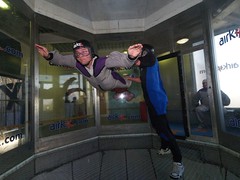 |
| By 24x7learning.com CC-BY-SA-3.0, via Wikimedia Commons |
The first online class (for people who could not attend the on-campus workshop) is scheduled for Wednesday 13 February 2013 - 09:30 - 11:30 via Adobe Connect. Most people who responded to the Doodle survey can make it at this time. Subsequent times and days will be negotiated with you. If you are unable to attend and are feeling lost about where to start, please get in touch with Bronwyn asap.
A reminder about this week's topic - details are on the course wiki.
You are scheduled to begin exploring the principles of flexible learning and will be deciding on a definition for your teaching context. Two activities are suggested to guide your work in this topic, and to get you thinking about flexible learning in your context and also in other contexts. Often it is useful to hear what others are doing as well. The concept of Blended Learning is considered since this is the reality for most of us now. The learning objectives for this topic are:
- Define flexible learning in your context.
- Explore principles and processes of flexible learning and teaching.
- Investigate multiple dimensions of flexible learning.
- Critique a variety of examples of existing flexible learning and teaching options.
- Reflect on how the dimensions of flexible learning could be applied in your context.
Must have resources suggested for exploring this topic are:
- Casey, J. & Wilson, P. (2005). A practical guide to providing flexible learning in further and higher education. This is a very useful resource about flexible learning.
- Collis, B. & Moonen, J. (2001). Flexible learning in a digital world. Open and Distance Series. London: Kogan page Ltd. Chapter One - Hard copy or Google book.
- A copy of Chapter One is available on Moodle in the Flexible Learning folder.
- Oliver, M. & Trigwell, K. (2005). Can blended learning be redeemed? E–Learning, 2(1), 17-26. Retrieved from http://tinyurl.com/b5z93gd
I highly recommend that you check out the ebook by Diana Oblinger Game Changers: Education and Information Technologies. Look for one or two examples of blended learning to explore. For example, SUNY Empire State College: A Game Changer in Open Learning - this College uses mentoring, learning agreements and RPL processes in a progressively designed curriculum. This reference will also be added to the wiki for this topic and the Resources page.
Please add your questions and comments either to this blog or to the discussion forum in Moodle.
Labels: week2 FL13, What is flexible learning?
 |
| Blackberries by Szlagor |
Chocolate fish this week for Roger and Christine who have put links to their blogs on the Moodle discussion forum. I have now listed links to Roger and Christine's blogs here on the Course blog. There is also a link to the Course wiki on the blog. Please get your blog links up there this week. If you wish to use Moodle as the entry to the course - links to the Course wiki and Course blog are now available there, plus a link to Moodle chat if anyone wants to use that facility.
Subscribing to other participants' blogs
It saves time if you subscribe to each blog. Instructions on how to do this are in the Introduction section 1.1.3 Subscribing to other peoples' blogs.
This week's topic
Now is your chance to really explore flexible learning and find answers to the question on the topic - What is Flexible Learning? Last week in class we discussed Flexible Learning as anytime, anywhere, anyhow learning where student choice and structure were regarded as important. We also started looking at the five dimensions of flexible learning. Check out the readings on the wiki. This week you need to complete activity two. Contact me if you need help finding a buddy.
Activity Two: Find yourself a buddy in the class, and discuss the following questions:
- What does the term Flexible Learning mean to you?
- Why is it necessary to use a more flexible approach in your work?
- What do you need to explore to help this happen?
- What goals do you have for using Flexible Learning in your work?
- Post responses to your blog.
 |
| Figure 2. The five dimensions of flexibility (Source: Collis and Moonen, 2004) |
Labels: FL11, week two, What is flexible learning?
This week we are exploring the meaning of the term flexible learning. We started looking at this in the first workshop and there were some very broad ideas about this. For example, during the brainstorm session people came up with: creative approaches (especially learner-based), getting away from traditional classroom approaches, learning together in agreed ways, access, alternate assessment, learning styles and so on.
There is a recording (60 mins) of the introductory online session.
Flexible learning can occur anywhere, anyhow, anyway...
To do this week
Your job this week is to see if you agree with the ideas on the course wiki - Flexible Learning Guidebook - and in the readings and contribute to the online discussion. A hard copy reading (Flexible learning its not just about distance) has been posted to people who did not get one at the onsite workshop. There is also an online reading and a reflection question.
If you were unable to attend the first workshop sessions, or enrolled recently, I have asked about your availability this week to attend a class session. You will get an email soon to confirm a day and time - please make sure you reply to my short email quiz.
Group email Discussion forum
In the meantime, make sure you introduce yourselves on the email Discussion forum - several people have done so already. We have people from a variety of different areas. Post to:
flexible-learning-class-discussion@googlegroups.com And please contribute your ideas about flexible learning. The activities and links to material are all under the class wiki topic - What is flexible learning?.
Assessment due
The first assessment is due 19 February - this is your Learning Plan. It will not take you long to do but please make sure you request an extension if you cannot get anything to me by Friday - a draft will do if you cannot get the full version done. Remember though your Learning Plan is something you can keep adding to and changing as you progress in the course.
Next Scheduled Workshops
Date: February 25th - Examples of Flexible Learning
- Onsite: 10:30-12:00 in D315 (D block on Harbour Terrace).
- Online: 10:30-12:00 via web conferencing.
Date: 4 March - Examples of Flexible Learning - new date not on the Course Outline
- Repeat session online: 19:00-20:30
Labels: FL10, week 2, What is flexible learning?
 Image: Chocolate fishes by Ivan Mliniaric
Image: Chocolate fishes by Ivan Mliniaric
It is excellent to see some people's blogs up and running. Chocolate fish to John and Katy who have activated their blogs. Julie and Vili are joining this class and will be corresponding on email rather than on a blog. Nigel is going to be studying from Tonga using mainly email and is taking resources on a CDROM. Connection to the Internet is expensive and unreliable. A good example of how we need to consider Access and equity - a topic coming up later on in the course.
So it would be great if everyone could join the Flexible Learning email Group - just add your email to the subscribe box on the Flexible learning Blog participate section - you will need to scroll down. That way Nigel can communicate with you all and send out his work on email; he will not be recording his learning using a blog.
What is on over the next while?
Library sessions - effective use of online databases and Google Scholar - Monday 10 August 11-12 and Thursday 13 August 9-10 - BG1 (back room ground floor) at the Bill Robertson library - 135 Union Street East, Dunedin.
Over the next two weeks we are looking at: What is flexible learning
The full To Do list is on the blog. In summary:
- 1. Reading - book chapter: Collis, B. & Moonen, J. (2001). Flexible learning: it's not just about distance. Let me know if this has not arrived.
- 2. Writing - On your blog, write a short story about a day in the life of someone who is considering doing your course. This person has a range of flexible learning needs. ...
- 3. Supporting - Leave a comment and/or suggestion on another participant's blog.
- 4. Attending - Attend workshops (optional): Face-to-face - weekly on Wednesdays 1200-1300 in H208A - an meeting link online web-conference link will be set up as well. Online fortnightly - 21 August 1930-2030 using the web conference (Elluminate) meeting link.
- An experiential session on how to write effectively for a blog in this course - will be the subject for the face-to-face (19 August) and online meetings (21 August). This was previously offered in an online session in semester one and here is the recording.
Labels: FL09, FLsem209, What is flexible learning?
Image: Learning to Fly at Airkix by gavinandrewstewart
Great progress everyone with getting your blogs up and running and completing the other requirements for the first two weeks of the course. A list of 2009 participant blogs is now available on the "Participate" page with a sample of the latest work included on the right. It is set up so a short snippet shows up each time someone updates their blog. If people prefer they can just look at the list if they do not want to subscribe to an RSS reader such as Bloglines or Google reader. What have we got in store for you next? The estimated time for you to spend on this topic is three weeks - 30 March to 19 April 2009 (includes Easter break).
Over the next three weeks, you will be exploring the concept of flexible learning and working to broaden your understanding about this important area. If you already know something, which I am sure you all do, now is your chance to discover new ideas in areas you may have avoided until now. For example, online learning, recognition of prior learning, negotiated learning, project work etc.
In a nutshell, flexible learning can be regarded as anytime, anyplace, anyhow options for teaching and learning. It just depends on the form it takes to make it happen and this is where the debate begins. Think about whether flexible learning is just about access to learning opportunities, or is it also about the ways in which people learn best?
To do
1. Read more about flexible learning from the perspective of the Australian Flexible Learning Framework's Flexways site and the extra resources below.
2. On your blog, write a short story about a day in the life of someone who is considering doing your course. This person, called X, has a range of flexible learning needs. Your story should highlight issues that X may have for NOT doing your course, as it is set up at the present time.
The person called X may have some of the following issues: has a full time job and can't afford to leave it for study; is unable to move towns to attend classes; has difficulties learning in classrooms and at the pace of others; is unable to pay fees; believes your course does not fit exactly the range of things X wants to learn, may not feel comfortable using computers, has a disability, has family responsibilities...
The purpose of you writing this story is to consider as many reasons as you can where people might NOT be able to access your course (or an aspect of your course). HINT: If you are able, it is best to base your story on a real situation which you have encountered or heard about.
3. Leave a comment and/or suggestion on another participant's blog.
4. Attend workshops
An experiential session on how to write effectively for a blog in this course - 2 April 1-3pm in H311. This will also be offered in an online session - now Wednesday evening 22 April 7 - 8 pm NZST. Before the session you might like to download a three-step template for use in the session. Here is the Elluminate recording of the online session - How to write effectively for a blog.
Some sites to look at before the session:
Five tips for writing better blog posts by Sue Waters;
10 tips on writing a blog post by Lyndon from Flockblog;
My PLE is like my cooky baking (PLE = personal learning environment) - a good example of a post by Sarah Stewart.
Also check out this example. What is Flexible Learning? by Nutrition matters.
Library session - effective use of online databases and Google Scholar - Thursday 9 April - 1.30-2.30 in BG1 (back room ground floor) at the Bill Robertson library - 135 Union Street East, Dunedin. Jacinda Boivin will show you in a hands on session how to become more effective at finding online information using the online databases and Google Scholar.
An online version of this is being organised so watch this space.
Labels: FL09, What is flexible learning?

